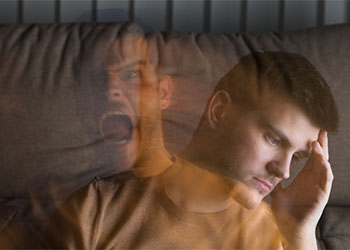Mental Health & Criminal Defense
Feb. 27, 2023
 Individuals facing criminal charges have the right to a fair defense. There may be times when a fair defense involves considering mental competency as a possible strategy. In some instances, a charged individual may lack the mental capacity to face a fair trial. As a result, considering mental health as a defense may be the best alternative.
Individuals facing criminal charges have the right to a fair defense. There may be times when a fair defense involves considering mental competency as a possible strategy. In some instances, a charged individual may lack the mental capacity to face a fair trial. As a result, considering mental health as a defense may be the best alternative.
Please note that the goal of this discussion is not to criminalize mental health illness or disorders. Rather, the aim is to acknowledge the role that mental illness can play in people’s judgment and actions at any point in their lives. For instance, a person suffering from a serious and/or undiagnosed mental health problem is at risk of spiraling and committing an unlawful act out of fear.
At the Richman Law Office LLC, we strive to defend our clients’ right to a fair defense. From our Kansas City office, we proudly serve residents of both Kansas and Missouri.
Common Mental Health Disorders
According to CDC data, 1 in 5 American experience mental health issues. It's estimated that 1 in 5 children are or will experience mental health issues at some point in their lives. Unfortunately, 1 in 25 Americans lives with a serious mental health condition such as bipolar disorder, schizophrenia, or severe depression.
These figures highlight the prevalence of mental illness. As a result, it is not unreasonable to believe that mental health issues can lead to or be the root cause of criminal behavior.
According to the World Health Organization, the following is a list of the most common mental health conditions:
Anxiety
Depression
Bipolar disorder
Post-traumatic stress disorder (PTSD)
Schizophrenia
Eating disorders
Disruptive behavior
Dissocial conditions
Neurodevelopmental disorders
If a person with one or more of the above conditions has been charged with a crime, a skilled criminal attorney can help build a defense strategy accordingly. Please bear in mind that mental illness is not treated as an excuse or ticket to commit a crime. Rather, evidence of a defendant having a mental health condition can help judges and juries understand the full picture of a case and thus assign fair penalties accordingly.
Mental Health as a Defense
The question, “can mental health be a defense for committing a crime?” can be answered by focusing on two key factors:
Criminal Responsibility
A mental health defense can look to establish criminal responsibility for a person’s actions. While mental health may not acquit a charged individual, it can help establish the motive (or lack thereof) for their actions.
For example, say an individual suffering from PTSD seriously injures another individual after being triggered during a traffic altercation. The individual is charged with aggravated assault. However, the defense establishes that the altercation triggered his actions due to his mental condition. Consequently, felony assault charges can be reduced to misdemeanor assault.
In this scenario, the individual’s responsibility is not totally eliminated. Nevertheless, the charges are framed within the proper context. Instead of going to jail, the individual may be sentenced to therapy with a licensed mental health professional.
Mental Competency
There are circumstances in which a person may be unable to comprehend the extent of their actions. For example, a person with a serious cognitive and developmental condition may be unable to determine whether their actions can cause harm.
For example, a person suffering from a developmental condition cannot fully understand that stealing is wrong. The person is tricked into committing a robbery. However, the individual does not comprehend that their actions constitute a crime.
In this scenario, the charged party does not have the competency to stand trial because they are unable to understand the charges or comprehend the nature of criminal proceedings. While the circumstances do not preclude their responsibility, the individual may be sentenced to care and treatment at a mental care facility.
Please note that a mental health condition defense depends on rigorous testing and evaluation by court-appointed mental health professionals. Therefore, retaining the services of an attorney experienced in mental health defense is a crucial component of this strategy.
Proving a Mental Health Claim
The basis for proving a mental health claim depends on various factors.
Thorough testing and evaluation
Expert opinion and testimony corroborating mental competency
Local legislation allowing mental health as a defense
The extent of the crimes
The individual’s motives, or lack thereof
The circumstances surrounding the criminal actions
Please bear in mind that proving a mental health claim is not a quick or inexpensive process. The defense needs to hire its own team of experts to evaluate the individual and refute any counterarguments from court-appointed mental health professionals.
Sentencing & the Rights of Prisoners With Mental Health Disorders
Depending on the severity of crimes, prisoners with mental health disorders may be sentenced to a mental health facility instead of a state or federal prison.
Additionally, prisoners sentenced to a state or federal prison must receive careful attention to ensure their well-being. Prisoners with severe mental health disorders, making them prone to violence, may be isolated to protect other inmates.
Above all, a mental health or insanity defense must ensure the charged individual’s rights are protected, especially if the individual is unable to take care of themselves fully.
Speak With an Experienced Attorney
As the leading attorney of Richman Law Office LLC, I strive to put my knowledge and experience to work for my clients. I believe in providing high-quality legal advice to those who need it most. If you’re considering a mental health defense, reach out to my firm today to take the first step in protecting your right to a fair defense.
